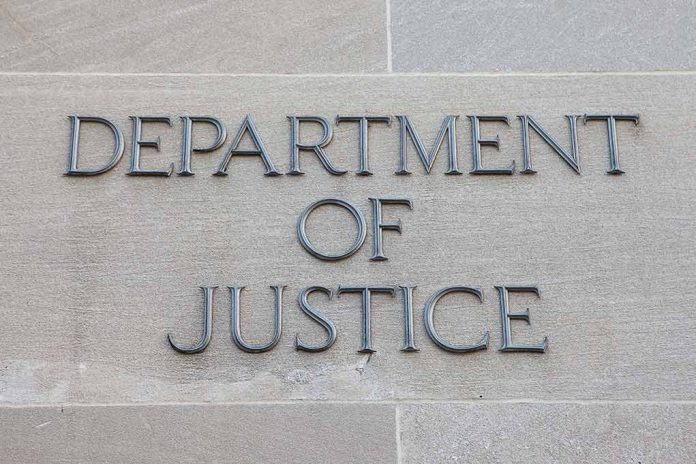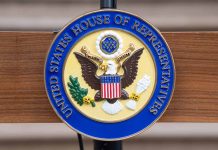
The Justice Department has leveled charges against six individuals for a multi-million dollar scheme targeting government IT contracts, shaking the foundations of procurement integrity and subjecting taxpayer funds to exploitation.
At a Glance
- Justice Department charges six for defrauding government agencies through bidding, kickback, and bribery schemes.
- Victor Marquez and Breal Madison Jr. are key figures, facing multiple charges including wire fraud and bribery.
- The scheme targeted IT manufacturers, distributors, and resellers selling to government purchasers.
- Case highlights erosion of competitive fairness and significant drainage of taxpayer resources.
Justice Department Unveils Charges in Landmark Case
In a significant move to combat corruption in government contracting, the U.S. Justice Department has charged six individuals in a sweeping fraud scheme targeting IT contracts. The case, described as the first in an ongoing investigation, reveals a complex web of illegal activities including bid rigging, kickbacks, and bribery that have compromised the integrity of government procurement processes.
The charges come as a stark reminder of the vulnerabilities in the government’s procurement system, particularly in the critical area of information technology. This case has sent shockwaves through the contracting community and raised serious questions about the oversight of billion-dollar contracts that impact national security and taxpayer resources.
US charges 6 for conspiring to defraud agencies through IT contracting schemes https://t.co/7gYRLMyKKb @TheSiliconHill
— Bradford Sims (@Bradford_Sims) October 30, 2024
Key Figures in the Fraud Scheme
At the center of this scandal are Victor Marquez and Breal Madison Jr., whose alleged actions have exposed the depth of corruption within the system. Marquez, the owner of two IT companies, faces charges of wire fraud conspiracy, wire fraud, and major fraud against the United States. His alleged involvement in bid rigging and inflating contract payments underscores the sophisticated nature of the fraud.
Madison’s case is equally troubling. Indicted on 13 counts, including conspiracy, bribery, mail fraud, and money laundering, he is accused of defrauding his employer and government agencies of over $7 million. These charges highlight the multifaceted nature of government contract fraud and the significant financial impact on taxpayers.
Wider Implications for Government Contracting
The case has broader implications for the government contracting process. It has drawn attention to companies like Rubrik, a cloud cybersecurity firm, which received a grand jury subpoena regarding potential violations related to government contracts last year. This development underscores the far-reaching nature of the investigation and the potential for further revelations in the tech industry’s dealings with the government.
“We are deeply disturbed by the alleged conduct by a former employee related to a scheme to defraud Rubrik and the government. The alleged behavior is inconsistent with our values and business ethos and is in violation of our code of conduct and other company policies. As previously disclosed in public filings, we have been cooperating with authorities and will continue to do so” – a Rubrik spokesperson
The Justice Department’s emphasis on maintaining competition and integrity in government procurement processes is clear. Assistant Attorney General Jonathan Kanter of the Justice Department’s Antitrust Division stated, “Antitrust crimes can undermine competition for products and services that are vital to our national security.” This statement underlines the critical nature of these contracts and the potential national security risks posed by fraudulent practices.
A History of Procurement Fraud
This case is not an isolated incident but part of a troubling pattern in government contracting. Previous high-profile cases, such as Boeing’s $615 million settlement for improperly using competitor information, illustrate the long-standing nature of these issues. The Boeing case, which involved a former Air Force official, resulted in guilty pleas for conflict of interest violations and highlighted the need for stringent oversight in defense contracting.
The current case serves as a stark reminder of the ongoing challenges in maintaining integrity in government procurement. It underscores the need for robust systems to prevent fraud, protect taxpayer resources, and ensure that contracts critical to national security are awarded fairly and transparently.
Looking Forward: Strengthening Procurement Integrity
As this case unfolds, it’s clear that more must be done to safeguard the government procurement process. The creation of the Department of Justice’s Procurement Collusion Strike Force (PCSF) in 2019 was a step in the right direction, but this recent case shows that vigilance must be ongoing and evolving.
The public is encouraged to report procurement fraud to the PCSF, highlighting the role of whistleblowers and public vigilance in combating these crimes. As the government continues to rely heavily on private contractors for critical services and technologies, ensuring the integrity of the procurement process remains paramount for national security and fiscal responsibility.
Sources:
- Six charged with conspiring to defraud agencies with IT-contracting schemes
- OSI’s $615M fraud recovery
- Military Contractors Indicted for $7 Million Procurement Fraud Scheme
- Six Charged in Scheme to Defraud the Federal Government
- Understanding Government Contract Fraud: Can Contractors Be Criminally Charged?















